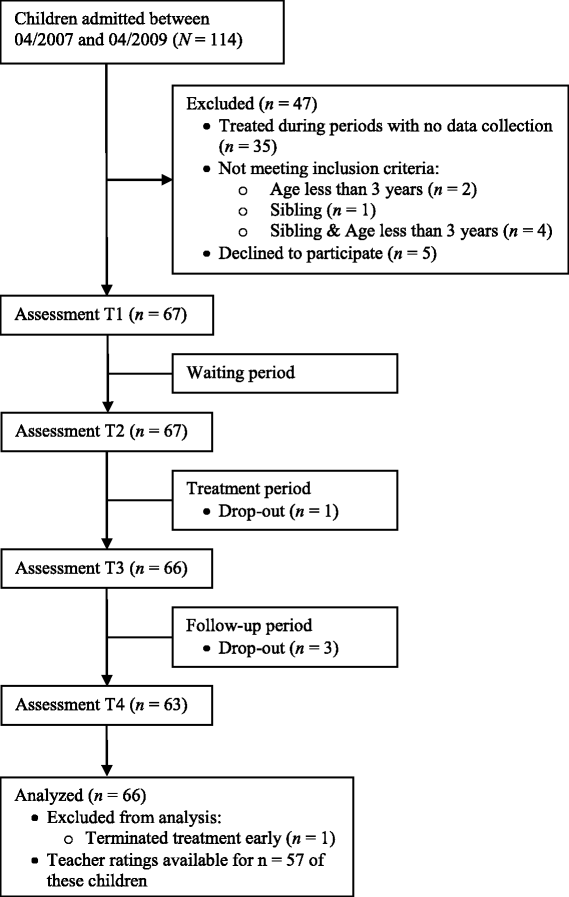Parent-child inpatient treatment for children with behavioural and emotional disorders: a multilevel analysis of within-subjects effects
- PMID: 26573683
- PMCID: PMC4647488
- DOI: 10.1186/s12888-015-0675-7
Parent-child inpatient treatment for children with behavioural and emotional disorders: a multilevel analysis of within-subjects effects
Abstract
Background: The importance of parental involvement in child treatment is well-established. Several child psychiatric clinics have, therefore, set up inpatient family units where children and parents are both actively involved in the treatment. Unfortunately, evidence supporting the benefits of these units is sparse.
Methods: We evaluated the effectiveness of inpatient treatment for families with severe parent-child interaction problems in a child psychiatric setting. Consecutive admissions to the parent-child ward (N = 66) were studied. A within-subjects design was used with four assessment points (baseline, admission, discharge, four-week follow-up). Outcome measures were 1) parent and teacher ratings of child behaviour, and 2) parent self-ratings of parenting practices, parental strains and parental mental health. Data were analyzed using multilevel modelling for longitudinal data (piecewise growth curve models).
Results: All parent-rated measures improved significantly during the four-week treatment period (d = 0.4 - 1.3). These improvements were significantly greater than those observed during the four-week pre-admission period. In addition, benefits were maintained during the four-week follow-up period. Only parents' self-efficacy in managing their child's behaviour showed continued improvement during follow-up. Teacher ratings of children's disruptive behaviour at school were stable during the pre-admission period and showed significant improvements at follow-up (d = 0.3 - 0.4).
Conclusions: We conclude that parent-child inpatient treatment has positive effects on child and parent behaviour and mental health, and can therefore be recommended for children with behavioural and emotional disorders and severe parent-child interaction problems.
Figures




Similar articles
-
Detecting effects of the indicated prevention Programme for Externalizing Problem behaviour (PEP) on child symptoms, parenting, and parental quality of life in a randomized controlled trial.Behav Cogn Psychother. 2010 Jan;38(1):95-112. doi: 10.1017/S1352465809990440. Behav Cogn Psychother. 2010. PMID: 19995467 Clinical Trial.
-
Which family factors predict children's externalizing behaviors following discharge from psychiatric inpatient treatment?J Child Psychol Psychiatry. 2006 Nov;47(11):1133-42. doi: 10.1111/j.1469-7610.2006.01651.x. J Child Psychol Psychiatry. 2006. PMID: 17076752 Free PMC article.
-
Behavioural and emotional problems in Iranian children four years after parental death in an earthquake.Int J Soc Psychiatry. 2010 Mar;56(2):158-67. doi: 10.1177/0020764008101854. Int J Soc Psychiatry. 2010. PMID: 20207678
-
Families with children with emotional disorders: a review of the literature.Soc Work. 1993 Nov;38(6):743-64. Soc Work. 1993. PMID: 8256146 Review.
-
[Intrafamilial disruptive behaviour disorders in children and adolescents: Present data and treatment prospects].Encephale. 2018 Apr;44(2):176-182. doi: 10.1016/j.encep.2017.09.002. Epub 2017 Nov 17. Encephale. 2018. PMID: 29153459 Review. French.
Cited by
-
Efficacy, Feasibility, and Acceptability of an Emotional Competence Tele-Intervention for Mandarin-Speaking Children Aged 5 to 7 Years With Developmental Language Disorder: Pilot Study With an Interrupted Time-Series Design.JMIR Pediatr Parent. 2025 Feb 11;8:e60333. doi: 10.2196/60333. JMIR Pediatr Parent. 2025. PMID: 39933173 Free PMC article.
-
[Characteristics of the population of a parent-child unit: early interaction-based treatment as a chance in child and adolescent psychiatry].Neuropsychiatr. 2024 Jun;38(2):62-70. doi: 10.1007/s40211-022-00430-3. Epub 2022 Sep 21. Neuropsychiatr. 2024. PMID: 36129671 Free PMC article. German.
-
Making the case for the family model in in-patient child and adolescent mental healthcare.BJPsych Bull. 2021 Oct;45(5):272-274. doi: 10.1192/bjb.2021.8. BJPsych Bull. 2021. PMID: 33583472 Free PMC article.
-
"A turn in the road, but still a rough journey" - Parent and child perspectives of outcomes after pre-adolescent inpatient psychiatric admission.Child Adolesc Psychiatry Ment Health. 2023 Sep 2;17(1):103. doi: 10.1186/s13034-023-00649-0. Child Adolesc Psychiatry Ment Health. 2023. PMID: 37660076 Free PMC article.
-
Parents' experience of a shared parent-child stay during the first week of hospitalization in a child psychiatry inpatient ward.Eur Child Adolesc Psychiatry. 2024 Apr;33(4):1039-1046. doi: 10.1007/s00787-023-02225-5. Epub 2023 May 18. Eur Child Adolesc Psychiatry. 2024. PMID: 37202584
References
-
- Green J, Jacobs B, Beecham J, Dunn G, Kroll L, Tobias C, et al. Inpatient treatment in child and adolescent psychiatry – a prospective study of health gain and costs. J Child Psychol Psychiatry. 2007;48:1259–67. - PubMed
-
- Herpertz-Dahlmann B, Schwarte R, Krei M, Egberts K, Warnke A, Wewetzer C, et al. Day-patient treatment after short inpatient care versus continued inpatient treatment in adolescents with anorexia nervosa (ANDI): A multicentre, randomised, open-label, non-inferiority trial. Lancet. 2014;383:1222–29. doi: 10.1016/S0140-6736(13)62411-3. - DOI - PubMed
Publication types
MeSH terms
LinkOut - more resources
Full Text Sources
Other Literature Sources
Medical

